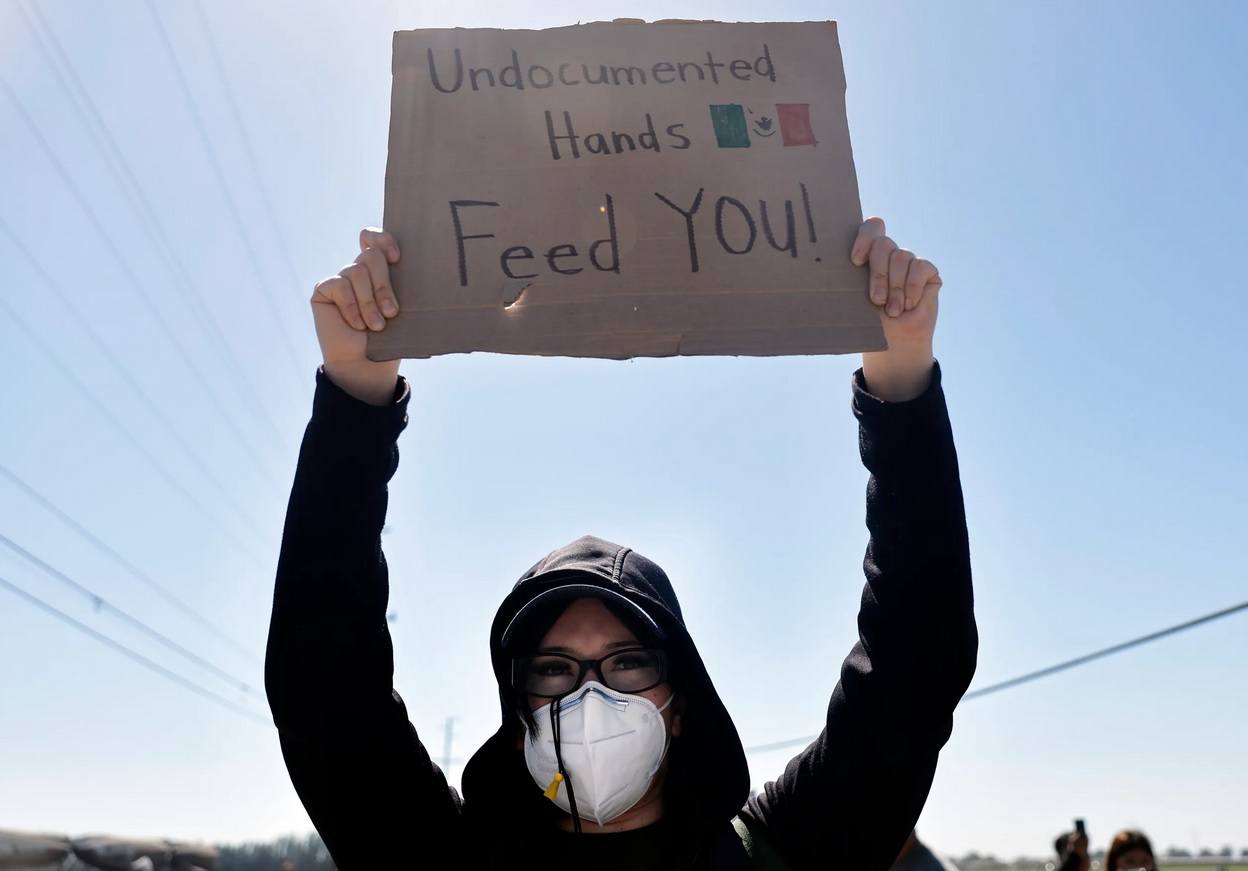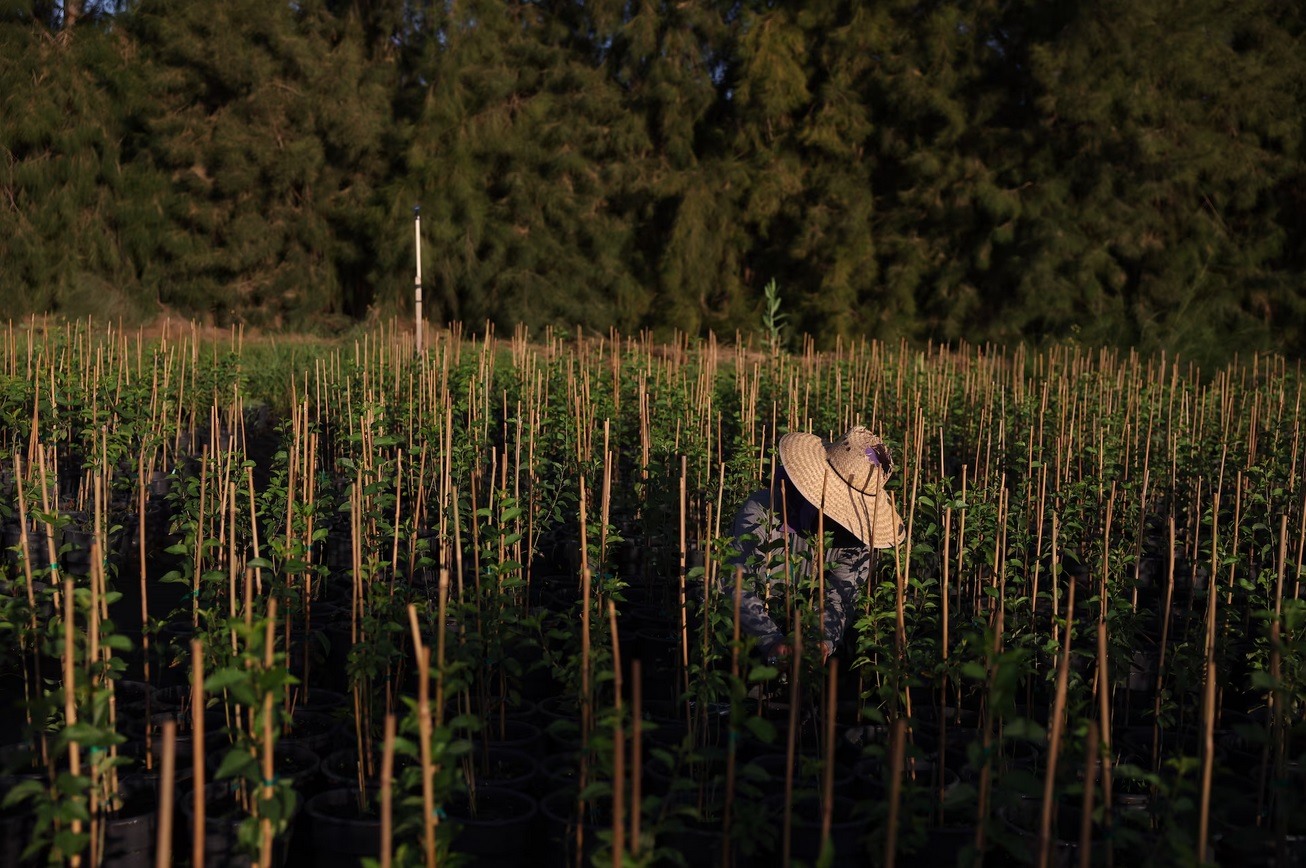by Brian Shilhavy
Editor, Health Impact News
As the Trump Administration continues arresting and deporting non-criminal migrant farm workers, some of whom actually have visas and even green cards and are here legally, including many who are actually Latino U.S. citizens, American farmers are losing up to 70% of their crops right now because their farm labor is too afraid to show up for work.
So it’s not surprising that a new poll published this week found that the majority of Americans are stressed about the high cost of their grocery bills as prices skyrocket all across the nation for fresh fruits and vegetables, as well as meat.
Here are some news reports from the past couple of weeks, from the farmers themselves and many of them Trump supporters, explaining how dire the current situation is for America’s fragile food supply chains.
Trump himself acknowledges this problem, saying he supports the farmers, but so far nothing has changed.
Vice President JD Vance seems to think that all these migrant workers in the agriculture sector can be replaced by technology and robots, showing his own ignorance when it comes to understanding the U.S. Agricultural system.
Deportation fallout: This farmer lost half his workforce. Now he’s losing his crop too
Oregon Farmer Ian Chandler. Source.
Excerpts (emphasis mine):
The Dalles, Oregon — The cherries are rotting on the trees in Ian Chandler’s orchards. Branch after branch hang heavy with fruit the Oregon farmer calls “mummified” — dark, shriveled and unappetizing.
They should have been picked a couple of weeks ago to tempt shoppers at markets and stores, or processed to garnish Shirley Temple mocktails, shiny and fat, promising bursts of sweetness.
The lost harvest has hit almost a quarter of Chandler’s 125 acres of cherry trees — not because of bad weather, disease or blight, just because there was no one to pick the fruit.
“What you’re going to see is a bunch of fat, happy raccoons this winter,” Chandler said ruefully, standing amid his still burdened trees. “Unfortunately, we weren’t able to harvest these.”
He said he’s built up a loyal seasonal workforce for his Wasco County operation called CE Farm Management, about 90 minutes from Portland, with the same people coming year after year and staying in touch with birth announcements and Christmas cards in between.
But this year half of them did not arrive, and many of his neighbors were scrambling for pickers too. All told, Chandler said he will lose $250,000-$300,000 of revenue, left to rot on the trees.
Chandler’s pickers are mostly Latinos who follow the harvests in the west and northwest. But with raids by Immigration and Customs Enforcement on cities and workplaces and detentions and even deportations ensnaring many with no criminal records, he has seen a dramatic drop-off in labor this year.
It’s a situation that’s being repeated across the nation as crops ripen for harvest. The US Department of Agriculture estimates 42% of hired crop farmworkers are undocumented immigrants, with no authorization to work. Another 26% are immigrants who have become citizens or permanent residents.
Since April, 1.4 million people have dropped out of the US labor force — 802,000 of whom were foreign-born, according to the Bureau of Labor Statistics. Farmworkers are not tracked in the official monthly jobs reports, but analysts agree immigration policy is having an impact generally across the nation.
The issue has come to the attention of President Donald Trump, who promised help for the agricultural sector in a Tuesday morning phone interview with CNBC.
“I take care of the farmers. I love the farmers. They’re a very important part of this country, and we don’t want to do anything to hurt the farmers,” he said.
Vice President JD Vance has said his preferred solution is automation.
But Chandler’s farm won’t be mechanized — he believes cherries are best harvested by hand, preferably an experienced one to not rip off next year’s crop that’s already showing as buds.
He does hire locally, but he says Oregonians, whether they are students on summer break or adults looking for full-time employment, only last in non-picking positions, like scanning buckets of produce or driving a tractor.
“I worked in high school in the cherry industry back in the 90s and then got back into this industry back in 2011 until current. You do not find people who are normally born here in the United States, unless they’re children of immigrants who are already doing this work, who want to work in this kind of industry,” he said. “It just doesn’t exist.”
Nevertheless, everyone hired by Chandler provides identification and work authorization so he does not know who may be in the country illegally.
“We’ve had relationships with these workers for years,” he said.
“You talk to a family, you get a good relationship with them, they recommend more family members, and that’s how you build up your workforce.
You could have all the children born in the United States, but if mom’s still trying to work through the immigration system, and has an issue, the whole family might say, ‘Look, we’re not going to risk it, because we don’t want mom to get picked up, so we’re going to stay down in California.’ So, then we lose our workforce.”
Farmers are facing a fork on Trump’s immigration highway. So what’s next?
Excerpts: (Emphasis mine)
For Candice Lyall, cherry harvest is always a race against the clock.
Eastern Washington is famous for its cherries, and in the fourth-generation farmer’s lush orchards, not far from Columbia River, there’s just a short window when they are the perfect ripeness. Wait too long and they are too soft for sale.
And they must be picked by hand. Lots of them.
Finding those hands locally can be a challenge. Like other growers, some of her workers are foreign-born, whose presence is reflected in the Hispanic restaurants in the nearby 3,300-resident town of Mattawa.
But this summer the harvest coincided with President Donald Trump’s mass deportation sweeps. Rumors swirled of roadway checkpoints. More than 100 workers who started Lyall’s harvest dwindled to 30 by the second week, leading her farm to struggle to get cherries picked in time.
Some were picked too late, she said, but the financial hit to her farm was likely to be far less than what some other growers experienced.
“There’s a lot of farms that didn’t pick because they didn’t have enough labor,” she said.
Lyall is a Trump supporter in a conservative farming region. She favors stricter border security because of worries of drug cartels. But she wants to see a path toward a stable workforce.
“There needs to be some solutions put on the table,” Lyall told USA TODAY.
Across the country, Trump’s immigration raids have roiled farms and farming communities – with cases of worker shortages and fears of unpicked crops. And it has fueled growing calls for the Trump administration to protect agricultural workers critical to the U.S. food supply.
Of the 2.6 million people working on U.S. farms, about 42% lack legal status, according to the Department of Agriculture and other estimates.
Farmers say few native–born residents will pick fruit or tend cows. The country’s foreign agriculture worker visa program can be costly, burdensome and limited. And farmers say Congress has failed for decades to pass comprehensive immigration reforms.
Those long-standing struggles are now compounded by the lurking presence of Trump’s masked immigration forces as harvest season approaches or is underway.
Earlier this month, raids on farms in California left hundreds detained, and soon after, a group of farmworkers in California held a three-day strike and called for boycotts.
At stake are potential disruptions to the U.S. food supply and higher consumer costs.
The Trump administration in June suspended farm enforcement but then reversed that decision. More recently, Trump has cited the importance of farm labor and said his administration would look into ways for farmworkers to “be here legally, they can pay taxes and everything.”
In Lincoln County, Wisconsin, where the rural landscape of pastures and fields is dotted with barns and silos, Hans Breitenmoser’s parents emigrated here in 1968 from Switzerland to raise dairy cows on a small farm.
He grew up amid the daily rhythms of feeding and milking. When the farm grew, they had to hire more workers. But they could find few native-born residents willing to take the jobs in the sparsely populated area. And over time, fewer younger people were sticking around the farms.
Now, the 56-year-old relies on about a dozen foreign-born workers, mostly from Mexico, to operate the 460-cow farm, not far from a shuttered church with peeling paint about five miles outside a town of 9,000 residents.
“If it wouldn’t be for immigrants, my dairy farm wouldn’t run,” he said.
In recent months, dairy farms in Texas reported absenteeism while ICE has detained or deported people at dairy farms in New York and Vermont.
Dairies are particularly vulnerable to labor shortages because cows need daily care to survive, Brietenmoser said, and cannot be temporarily shut down like a construction site or restaurant.
“Am I concerned about it? Absolutely,” said Breitenmoser, who said he was among a minority in Lincoln County who did not support Trump in 2024.
“They don’t get fed and they don’t get watered, and they don’t get milked and they don’t get cleaned up after, they will die.”
Across the nation today, about 70% of workers in the U.S. farm sector are foreign born, according to the Federal Reserve of Kansas City. The National Milk Producers Federation says milk prices could nearly double if the U.S. dairy industry loses its foreign-born workforce, the group said.
“The uncertainty that undergirds agricultural labor and immigration in the U.S. continues to harm workers and their families, farm employers, rural communities and national food security,” according to the federation.
Breitenmoser argues Trump’s political rhetoric painting immigrants as criminals and invaders, when most are workers filling jobs no one else will, is a self-defeating strategy.
“We’ve built an economy that relies on people, but we have a public policy that demonizes them. And to my way of thinking that just doesn’t make any sense,” he said.
“American farming cannot survive without foreign-born staff.”
“Somebody’s going to drive through McDonald’s to buy a freaking latte and a hamburger. And guess where that comes from? It comes from my farm.
And it doesn’t happen magically. It takes human beings, be they brown, Black, White, green or otherwise, to get the job done,” he said. “And that’s what our public policy should reflect.”
Immigration raids leave crops unharvested, California farms at risk
A Guatemalan immigrant works on a crop field at a farm in the Kern County, California, U.S., June 19, 2025. REUTERS/Pilar Olivares. Source.
Excerpts: (Emphasis mine)
“70% of the workers are gone,” one farmer said as most of the work is mostly done by immigrants, impacting business.
Lisa Tate is a sixth-generation farmer in Ventura County, California, an area that produces billions of dollars worth of fruit and vegetables each year, much of it hand-picked by immigrants in the U.S. illegally.
Tate knows the farms around her well. And she says she can see with her own eyes how raids carried out by agents from U.S. Immigration and Customs Enforcement in the area’s fields earlier this month, part of President Donald Trump’s migration crackdown, have frightened off workers.
“In the fields, I would say 70% of the workers are gone,” she said in an interview.
“If 70% of your workforce doesn’t show up, 70% of your crop doesn’t get picked and can go bad in one day.
Most Americans don’t want to do this work. Most farmers here are barely breaking even. I fear this has created a tipping point where many will go bust.”
In the vast agricultural lands north of Los Angeles, stretching from Ventura County into the state’s central valley, two farmers, two field supervisors and four immigrant farmworkers told Reuters this month that the ICE raids have led a majority of workers to stop showing up.
That means crops are not being picked and fruit and vegetables are rotting at peak harvest time, they said.
One Mexican farm supervisor, who asked not to be named, was overseeing a field being prepared for planting strawberries last week. Usually he would have 300 workers, he said. On this day he had just 80.
Another supervisor at a different farm said he usually has 80 workers in a field, but today just 17.
Most economists and politicians acknowledge that many of America’s agricultural workers are in the country illegally, but say a sharp reduction in their numbers could have devastating impacts on the food supply chain and farm-belt economies.
Douglas Holtz-Eakin, a Republican and former director of the Congressional Budget Office, said an estimated 80% of farmworkers in the U.S. were foreign-born, with nearly half of them in the country illegally.
Losing them will cause price hikes for consumers, he said.
“This is bad for supply chains, bad for the agricultural industry,” Holtz-Eakin said.
Over a third of U.S. vegetables and over three-quarters of the country’s fruits and nuts are grown in California, according to the California Department of Food and Agriculture. The state’s farms and ranches generated nearly $60 billion in agricultural sales in 2023.
Of the four immigrant farmworkers Reuters spoke to, two are in the country illegally. These two spoke on the condition of anonymity, out of fear of being arrested by ICE.
One, aged 54, has worked in U.S. agricultural fields for 30 years and has a wife and children in the country. He said most of his colleagues have stopped showing up for work.
“If they show up to work, they don’t know if they will ever see their family again,” he said.
The other worker in the country illegally told Reuters,
“Basically, we wake up in the morning scared. We worry about the sun, the heat, and now a much bigger problem – many not returning home.”
Study: Grocery costs stress majority of Americans
From Yahoo News:
A new study says a majority of Americans are stressed about grocery costs.
As grocery prices continue to rise, it’s becoming much more difficult to buy groceries and even harder not to be overwhelmed. A new survey done by the Associated Press shows that 53% of respondents say the cost of groceries is a “major” source of stress in their lives, while 33% say it’s a “minor” source of stress.
22News spoke with local shoppers in West Springfield, and here’s what they had to say.
“This tiny thing of fruit is 3.40 and that’s cheap, sometimes it can go up to five,” said Ruth Shatel.
“The prices were pretty high, there were things I thought I’d buy and then I thought, I can do without it,” said Diane Kautcmann.
The overall consensus was that prices for healthy foods like fruits, vegetables, and meat are especially out of control, while junk foods are cheaper.
Lack of Human Labor, Tariffs, and Too Much Spending on AI Spells Disaster for the U.S. Economy
The U.S. economy is heading into a very severe storm right now, with a severe labor shortage that Trump wants to hide as he recently fired the head of the Bureau of Labor Statistics for reporting the truth about the U.S. labor force this month.
They revised their report for jobs created in July downward, something they typically do every month as they get a better look at the statistics, as they did almost every month under the Biden Administration also.
On top of that we have not yet seen the full effects of tariffs, as it works its way through the supply chain.
In my own ecommerce company, for example, we are getting ready to pay our first tariffs of the year with our latest container from Italy, which is 10% of the total value of our container. It is only 10% because it was shipped before August, when the tariff rate went up to 15%.
We have a container due from the Philippines this month also which will be the first one that has tariffs attached, which we believe will also be 10% (even custom brokers are confused on this, and sometimes we just have to wait until it hits a U.S. port and find out what U.S. Customs is going to charge us).
The Philippine tariff was raised to 19% in August. But we won’t ship another container until the Fall, and who knows what will happen by then?
But the point here is that it takes time for these new tariffs to be assessed and work its way into the supply chain, and for businesses to then raise prices to compensate for the additional costs.
My online store Healthy Traditions sells premium foods that are tested for things like glyphosate and GMOs, and we are seeing a major reduction in spending by our consumers right now through the first two months of summer (June and July), which reflects a nationwide reduction in spending at online stores, the biggest slowdown in sales in over a decade!
(Note: because of low sales this summer, we currently have 70 – 75% clearance discounts on some of our meats from last year, as this year’s chickens are already on the ground in lush Wisconsin pastures and will be processed soon. But some of these sales end today, the day I am publishing this. Daily Deals are found here.)
Online shopping sees biggest slowdown in over decade as tariffs disrupt e-commerce: Survey
The e-commerce sector is experiencing its most disruptive period in more than a decade as a result of President Trump’s trade war and tariffs policy, according to a new survey from Alix Partners. It finds steep declines in online shopping activity, and shipping and return policies being adjusted to cut costs for companies.
Online purchases for home delivery experienced double-digit percentage, year-over-year declines across major categories, including office supplies, down by 13 percentage points; sporting goods, down 12 percentage points; and cosmetics, furniture, home furnishings, and large electronics, each falling by 10 percentage points, according to AlixPartners’ data.
“This marks the first widespread pullback in online category growth in over a decade,” said Chris Considine, partner with the consulting firm’s retail practice. (Source.)
Fortunately for our domestic products that we sell in our online store, like our grass-fed meats and pastured poultry products, we are NOT dependent on migrant labor, because we utilize the one last remaining sector in the U.S. workforce where Americans are not afraid to do the manual hard labor that is necessary to produce clean, healthy food: The Amish.
The Amish are the one sector of the U.S. economy that will survive a major collapse of the heavily dependent supply-chain frail food system, because they produce all their own food for their communities, and they live off the grid and are totally oblivious to the electrical grid disruptions and high costs.
They literally still travel around by horse and buggy, and use non-technological tools for farming.
Then there is this prevailing myth being published every day in both the corporate and alternative media in the U.S., that AI is replacing jobs run by humans.
As I have documented, this is NOT true! Workers, especially in the Technology sector, are losing their jobs because companies are spending TOO MUCH on AI, which has yet to produce most of their Techno-prophecies, some of which they have been predicting for over 20 years now (like fully automated driver-less vehicles).
See:
Has the AI Apocalypse Arrived? Tens of Thousands Being Laid Off in Big Tech – AI has to Either Replace Them or AI Spending Must Stop
You cannot produce food without human labor, and technology can NOT reverse the curse God pronounced on the earth when man sinned:
To Adam he said,
“Because you listened to your wife and ate from the tree about which I commanded you, ‘You must not eat of it,’
Cursed is the ground because of you; through painful toil you will eat of it all the days of your life. It will produce thorns and thistles for you, and you will eat the plants of the field.
By the sweat of your brow you will eat your food until you return to the ground, since from it you were taken; for dust you are and to dust you will return.” (Genesis 3:17-19)
It is truly amazing how quickly President Trump has put into place emergency executive orders (EOs) based on non-emergencies that are leading this country to a potential total economic collapse.
Unless the courts intervene to declare most of these EOs that bypass Congressional approval illegal, and stop the mass deportation of our workforce (REAL criminal migrants should be deported – who doesn’t agree with that?!), and get rid of the tariffs, this country is going to see economic hardship that practically nobody alive today has probably ever seen, such as the Great Depression leading up to World War II.
And the U.S. stock market hasn’t even crashed yet! A stock market crash was something that both Trump and Elon Musk last year predicted would happen shortly after Trump took office.
I guess Trump has been too distracted by the Epstein scandal. Here are some more news stories I have recently published on our Telegram Channel.
House Oversight subpoenas Clintons, Epstein files
The Epstein story is just not going away. However, anything happening in D.C. is pure theatrics. The DOJ is the only body that can actually press charges and prosecute, and they are the ones complicit in hiding the files!
Even a “Special Prosecutor” will probably get nowhere.
In my opinion, what is needed is a class action lawsuit in Civil Court by the victims. Even that would probably go nowhere, as it can be appealed all the way to the Supreme Court where justices are undoubtedly also guilty of participating in the Epstein criminal network. But a civil suit would keep this story going and reveal a lot of information.
From Axios:
House Oversight Committee Chairman James Comer subpoenaed multiple former government officials, including Bill and Hillary Clinton, and former FBI director James Comey — and is demanding the Justice Department release all documents related to its Jeffrey Epstein probe.
Why it matters: Despite President Trump’s efforts to shut down questions surrounding Epstein, Democratic lawmakers have time and again forced their Republican colleagues to confront the issue.
The subpoena demands the DOJ turn over all Epstein-related materials by August 19.
The panel is also seeking to compel testimony from former Attorneys General Loretta Lynch, Eric Holder, Merrick Garland, William Barr, Jeff Sessions, and Alberto Gonzales — as well as from former FBI director Robert Mueller.
The deposition dates Comer announced range from Aug. 18 (Barr) to Oct. 14 (Bill Clinton).
The big picture: Trump and his GOP allies in Congress have faced an uproar from their MAGA base ever since the DOJ concluded last month that Epstein had no “client list” and died by suicide.
The subpoenas that Comey issued Tuesday are a direct rebuke of GOP leadership, which has worked to sideline Epstein-related votes.
Speaker Mike Johnson (R-La.) has consistently called for transparency in the case, and said “there’s no fear” among his conference around the issue.
Israeli Hostages are Starving to Death
Saraya Al-Quds, the militant branch of Hamas, released videos last week of two remaining Israeli hostages, Ron Breslavsky and Evyatar David, who appear to be starving to death in Gaza, causing much hardship in Israel among their families.
Remember, BOTH Donald Trump and Benjamin Netanyahu have been funding these Hamas terrorists since before the Oct. 7, 2023 Hamas attacks. See:
Israeli Media Reveals that Hamas is Actually Funded by Israel – And of Course Israel is Funded by the U.S.
Jury orders Tesla to pay more than $240 million in Autopilot crash case
This is a very rare case against Tesla that actually made it to trial, because most cases are paid off by Tesla to avoid the publicity.
Miguel Custodio, a car crash lawyer stated:
“This will open the floodgates. It will embolden a lot of people to come to court.”
From AP:
A Miami jury decided that Elon Musk’s car company Tesla was partly responsible for a deadly crash in Florida involving its Autopilot driver assist technology and must pay the victims more than $240 million in damages.
The federal jury held that Tesla bore significant responsibility because its technology failed and that not all the blame can be put on a reckless driver, even one who admitted he was distracted by his cellphone before hitting a young couple out gazing at the stars.
The decision comes as Musk seeks to convince Americans his cars are safe enough to drive on their own as he plans to roll out a driverless taxi service in several cities in the coming months.
The decision ends a four-year long case remarkable not just in its outcome but that it even made it to trial. Many similar cases against Tesla have been dismissed and, when that didn’t happen, settled by the company to avoid the spotlight of a trial.
“This will open the floodgates,” said Miguel Custodio, a car crash lawyer not involved in the Tesla case. “It will embolden a lot of people to come to court.”
The case also included startling charges by lawyers for the family of the deceased, 22-year-old, Naibel Benavides Leon, and for her injured boyfriend, Dillon Angulo.
They claimed Tesla either hid or lost key evidence, including data and video recorded seconds before the accident. Tesla said it made a mistake after being shown the evidence and honestly hadn’t thought it was there.
“We finally learned what happened that night, that the car was actually defective,” said Benavides’ sister, Neima Benavides.
“Justice was achieved.”
Tesla has previously faced criticism that it is slow to cough up crucial data by relatives of other victims in Tesla crashes, accusations that the car company has denied.
In this case, the plaintiffs showed Tesla had the evidence all along, despite its repeated denials, by hiring a forensic data expert who dug it up.
Related:
The Digitalization of Agriculture: Big Tech’s Plan to Take Over the Food Supply
Comment on this article at HealthImpactNews.com.
This article was written by Human Superior Intelligence (HSI)
See Also:
Understand the Times We are Currently Living Through
New FREE eBook! Restoring the Foundation of New Testament Faith in Jesus Christ – by Brian Shilhavy
Who are God’s “Chosen People”?
KABBALAH: The Anti-Christ Religion of Satan that Controls the World Today
Christian Teaching on Sex and Marriage vs. The Actual Biblical Teaching
Exposing the Christian Zionism Cult
The Bewitching of America with the Evil Eye and the Mark of the Beast
Jesus Christ’s Opposition to the Jewish State: Lessons for Today
Identifying the Luciferian Globalists Implementing the New World Order – Who are the “Jews”?
The Brain Myth: Your Intellect and Thoughts Originate in Your Heart, Not Your Brain
What is the Condition of Your Heart? The Superiority of the Human Heart over the Human Brain
The Seal and Mark of God is Far More Important than the “Mark of the Beast” – Are You Prepared for What’s Coming?
The Satanic Roots to Modern Medicine – The Image of the Beast?
Medicine: Idolatry in the Twenty First Century – 10-Year-Old Article More Relevant Today than the Day it was Written
Having problems receiving our emails? See:
How to Beat Internet Censorship and Create Your Own Newsfeed
We Are Now on Telegram. Video channels at Bitchute, and Odysee.
If our website is seized and shut down, find us on Telegram, as well as Bitchute and Odysee for further instructions about where to find us.
If you use the TOR Onion browser, here are the links and corresponding URLs to use in the TOR browser to find us on the Dark Web: Health Impact News, Vaccine Impact, Medical Kidnap, Created4Health, CoconutOil.com.
























